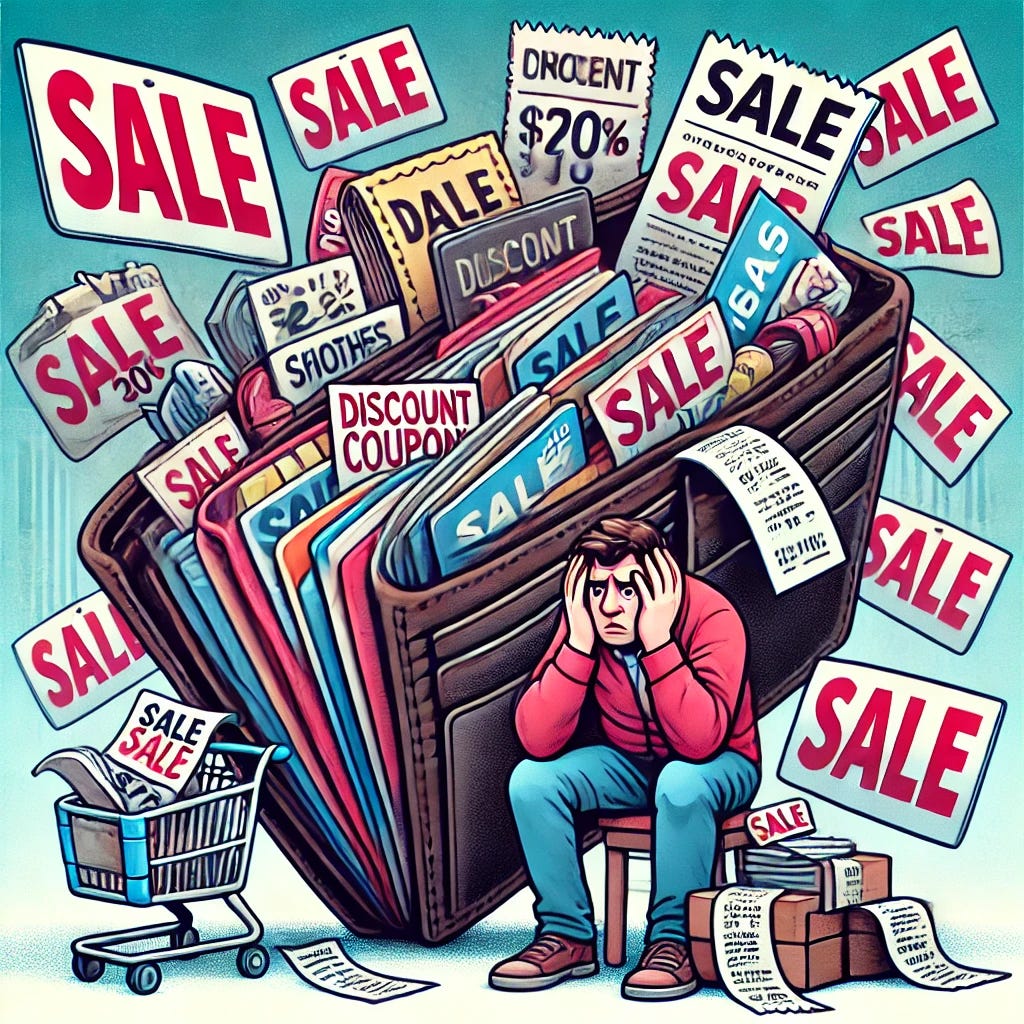How Discounts Can Hurt Your Wallet
the hidden costs of being 'cheap'
Happy Friday! We’ve made it through another week. Take a moment to reflect on your progress, and use today to set yourself up for success in the coming days. Enjoy the finish line!
But before we start, here’s a dose of positivity for you:
‘Do something today that your future self will thank you for’
Now, let’s get started…
Why should you stop shopping during the discount season?
In a world where discounts and sales dominate consumer culture, it’s easy to believe that saving money is as simple as taking advantage of a deal. With “50% off” and “buy one, get one free” flashing in your face every time you shop, it’s tempting to fill your cart with items you don't need. But what if I told you that these seemingly innocuous discounts might be costing you much more than you realize in the long run?
1. The 'hidden discount'
Discounts often lure you into spending more time hunting for deals than you originally intended. The process of sifting through various platforms, waiting for sales events, and following brands for exclusive offers takes a surprising amount of energy and time.
The cost here isn’t just the hours spent but the opportunity cost. Think about how much more productive or fulfilling that time could have been if spent on activities that genuinely contribute to your personal or financial growth, like learning a new skill, exercising, or focusing on a side project.
This hidden cost, often unnoticed, drains your time and energy, leaving you less able to pursue your goals. As a result, these time-sucking bargain hunts could be reducing the potential long-term gains you could have achieved.
2. The discount trap that plays on your psychology
The psychology behind discounts is potent and designed to trigger emotional responses. That “limited-time offer” triggers the fear of missing out (FOMO), pushing you to buy things you never needed in the first place. According to behavioral economics, consumers tend to value items more when they believe they're getting a deal, even if the price is still above what they can afford.
Over time, these emotional triggers can build up a tendency to justify purchases that don’t align with your financial goals, creating a pattern of spending driven more by emotional highs than logical financial decisions. This can have a subtle but significant impact on your financial health, as impulsive shopping becomes a coping mechanism for stress or anxiety.
3. The true price of overconsumption
One often overlooked consequence of discount shopping is its environmental impact. Cheap, mass-produced goods are often made using unsustainable practices. The relentless push for low prices typically sacrifices ethical manufacturing, labor standards, and environmental sustainability.
The more you buy into these “bargain” deals, the more you contribute to a cycle of overproduction and overconsumption. These mass-produced items, which are made cheaply to hit those low price points, often end up in landfills faster due to their short lifespans. The carbon footprint of these products - when you factor in their manufacturing, shipping, and disposal - far exceeds the small savings you get from buying them. So, while your wallet may feel lighter at the moment, the long-term environmental impact is a cost that should be carefully considered.
4. The vicious cycle of financing 'savings'
Many retailers offer discounts paired with financing options - “Buy now, pay later,” or “0% interest for the first six months” - which can make expensive purchases feel more manageable. However, if you're not careful, the habit of financing purchases can quickly snowball into debt.
The appeal of getting a high-ticket item at a discount while only paying a small installment today often leads to the accumulation of debt that can feel overwhelming later.
What’s even more dangerous is that these debt cycles can continue for months or years, with interest accruing on balances. The original "savings" you thought you were receiving gets eaten up by future debt repayments, which could have been avoided by simply saving for that purchase rather than taking on financing.
5. Subscription boxes and automatic replenishment
Another cost associated with discounted shopping is the rise of subscription-based services, which often lure customers in with an initial discount. Whether it’s meal kits, beauty products, or tech accessories, these services make it easy to sign up for recurring shipments. While the initial discount may seem attractive, the hidden cost lies in the ease of automatic renewals and the fact that many of these services may not be used as frequently as you anticipated.
Subscription services lock you into spending on a regular basis, which can eat into your budget without providing the value you expected. Over time, you might end up paying for subscriptions you rarely use or can live without, and by the time you realize it, cancelling can be a hassle.
In the end, real financial health isn’t about catching every deal that comes your way. It’s about being intentional with your spending, investing in quality, and thinking about long-term value rather than short-term satisfaction. Next time you see that 50% off sign, pause and ask yourself: Is it really saving me money in the long run, or is it costing me more than I think?
So, that’s it for today.
See ya 👋


